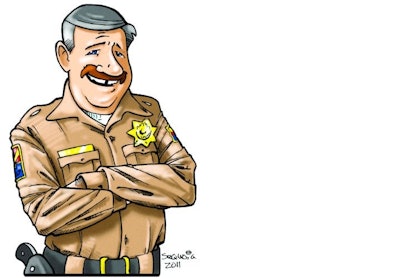 Illustration: Sequoia Blankenship
Illustration: Sequoia Blankenship
Recently my wife, the Sarge, and I were given the opportunity to speak to an academy class just prior to their graduation. We always find this exhilarating and enjoyable, but afterwards we almost always say the same thing to each other: "Poor kids, they still have hope." This time when we said that, we noted how incredibly cynical that sounds. And how proud we were of those young men and women starting their careers in what seems to be such a bleak and dangerous time for law enforcement.
We talked about the struggles they would face and the things that, even though we're not actively patrolling the streets anymore, we still have great concerns about. After the discussion, we packed up and headed for the next speaking engagement. That's when it hit me: people always accuse law enforcement of being cynical, but if we were true Cynics we wouldn't be going out and spreading the word about officer safety, leadership, and professionalism. It was the legendary trainer Bill Westfall who taught me years ago that the hero's path is not the way of the Cynic, but the way of the Stoic. Let me explain.
The Cynics were contemporaries of Plato and Aristotle. They sought to perfect their souls by deriding and rejecting the material world. The greatest of these was a fellow called Diogenes. He would roam the streets of Athens in search of a wise man, claiming he could never find one. He would often lie around all day, living off of the donations of his students; in other words he was a bit of a slug. It is said that when Alexander the Great found Diogenes lying naked in a bathtub outside, he asked him, "What can Alexander do for you?" To which Diogenes replied, "You can get out of my sun." Ironically, this greatly impressed Alexander, who later said that if he could not be Alexander, he would be Diogenes.
Fortunately, the great Aristotle was not as impressed as Alexander. Aristotle taught that true happiness and virtue came not from disengaging, but from actually participating in the real world. When Diogenes died, the Cynics became aimless, shiftless beggars. When Aristotle passed away, Aristotelian thought became the bedrock for most of what we know as Western civilization.
In the decade after Diogenes went to his bathtub in the sky, a fellow named Zeno started a school of philosophy while sitting on a porch in Athens. "Porch" in Greek is "Stoa," and he and his students were called Stoics. Fast-forward 300 years to the next great Stoic philosopher—a Roman slave named Epictetus—who taught that the key to happiness was to understand the nature of the material world and then control your thoughts, desires, and opinions toward it. The Roman Emperor, Marcus Aurelius, was the last famous Stoic; he lived a few years after Epictetus and wrote in his diary, "You have power over your mind—not outside events. Realize this, and you will find strength."
While the Cynics say "People are stupid" or "People are evil" and walk away, the Stoics say, "Some people are stupid and I can't change that; I can only control myself and choose to help them anyway," or "Some people are evil but I can't change them; I can, however, fight them to protect the innocent from the guilty."
As we spoke to that graduating class I noticed two young women who were undoubtedly idealistic; much like Plato they are going to change the world. I looked at the Sarge, 29 years of law enforcement under her belt, and I knew that while she'd probably been like those rookies once upon a time, like me she learned that you can't change the world or the nature of people. But you can affect the world around you. When evil arrives, we'll battle it. When blood runs, we'll stem the flow. When someone acts foolishly, we'll save them from themselves.
From now on, when someone calls you a "Cynic," tell them no, you're a "Stoic."
So my Stoic brothers and sisters, we know today people will do stupid things and get hurt, and do evil things and hurt others; and so it will be as it has always been, and you will answer the call and rush to save or stop them as our kind has always done. Just remember what that leads to … a life well lived.
Dave Smith is an internationally recognized law enforcement trainer and is the creator of "JD Buck Savage." You can follow Buck on Twitter at @thebucksavage.










